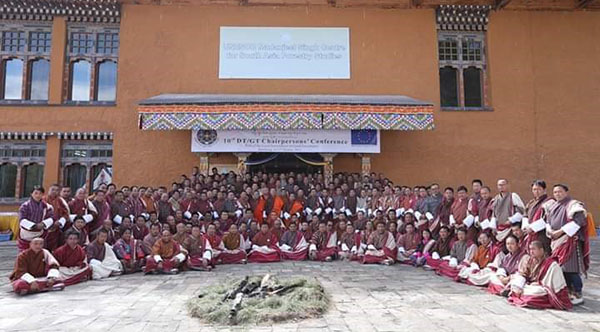 The government has asked the Gups across the country to initiate and get involved in job creation at the local government level at the two-day Dzongkhag Tshogdu and Gewog Tshogde Chairpersons’ conference, which concluded in Bumthang yesterday.
The government has asked the Gups across the country to initiate and get involved in job creation at the local government level at the two-day Dzongkhag Tshogdu and Gewog Tshogde Chairpersons’ conference, which concluded in Bumthang yesterday.
At the opening of the conference, the labour minister said youth unemployment would have high implications on the country’s economy if it is not addressed at the earliest possible.
According to Labour Minister Ugyen Dorji, the Labour Ministry alone is finding it difficult to create enough jobs for all the job seekers in the country. The Labour Ministry expects an estimated 62,000 jobseekers to join the job market in the next four years.
“The Gross National Happiness Commission after consulting the local leaders’ yourselves has increased the block grant by 100 per cent in the 12th Five Year Plan. The main purpose of such an increase is to enable local governments to initiate job creation programs and to develop the local economy. For this, the government has increased the block grant from Nu 25bn to 50bn,” Lyonpo Ugyen Dorji said.
He added that despite the various employment programs the government has in place currently, it is still difficult to absorb all the job seekers in the market. The minister also said that the government has formed an Employment Responsibility System about two months ago, which will be chaired by the prime minister, and the labour minister with all the government secretaries included in the committee. The committee intends to meet once every 2 to 3 months to deliberate on job creation and employment-related challenges faced in individual ministries and departments.
“All the discussions during the meeting will be on employment generation. If some employment policies need to be changed, we will change them, as the committee will be comprised of the ministers and secretaries. The system will also be able to review and revisit planned employment activities and programs. Essentially, the Employment Responsibility System will be working towards generating more employment opportunities in the country,” Lyonpo Ugyen Dorji added.
Prime Minister Dr Lotay Tshering who met with the Gups and Thrizins at the conference yesterday morning also said the local leaders would have to now work towards employment generation and sustaining the economy of individual Gewogs by themselves. This is because the country will soon graduate from the category of the Least Developed Countries’ category in 2023.
“Bhutan, being a Least Developed Country so far has received huge grants from international donors to support our economy. But as and when we graduate to the Developing Countries’ category, the grants will mostly be withdrawn and there will be a significant decrease in international aid and funding. That’s why we now have to work towards building a sustainable and resilient economy. For instance, at the grassroots level, Gups have to now think about initiating activities to generate enough income to sustain your individual Gewogs requirements apart from the activities included in the block grant from the central government.”
However, Gups and Thrizins at the conference raised concerns over limited budget in Gewog offices for job creation.
“We have received such recommendations from the central government in the past as well and we have been working towards employment generation. However, as we have already done all the planning and budget allocation for the 12th Five Year Plan, so we need an additional budget if we are to initiate job creation activities in our Gewogs, ” Ugyen Wangchuk, Gelegphu Gup of Sarpang, said.
“As the block grant has to be used for planned activities and programs, we will face budget constraints if we have to get involved in employment generation. We can still contribute to the cause by encouraging the youths to take up jobs in rural places and briefing them on the benefits of such professions,” Wangyel, the Gup of Trong Gewog in Zhemgang, said.
Meanwhile, the government is also working towards changing prevailing policies to attract graduates in Technical and Vocational Education and Training (TVET) institutes to address unemployment issues. The government also plans to invest more in technical training to produce technical workforce befitting the changing demand in the market.
Kipchu







